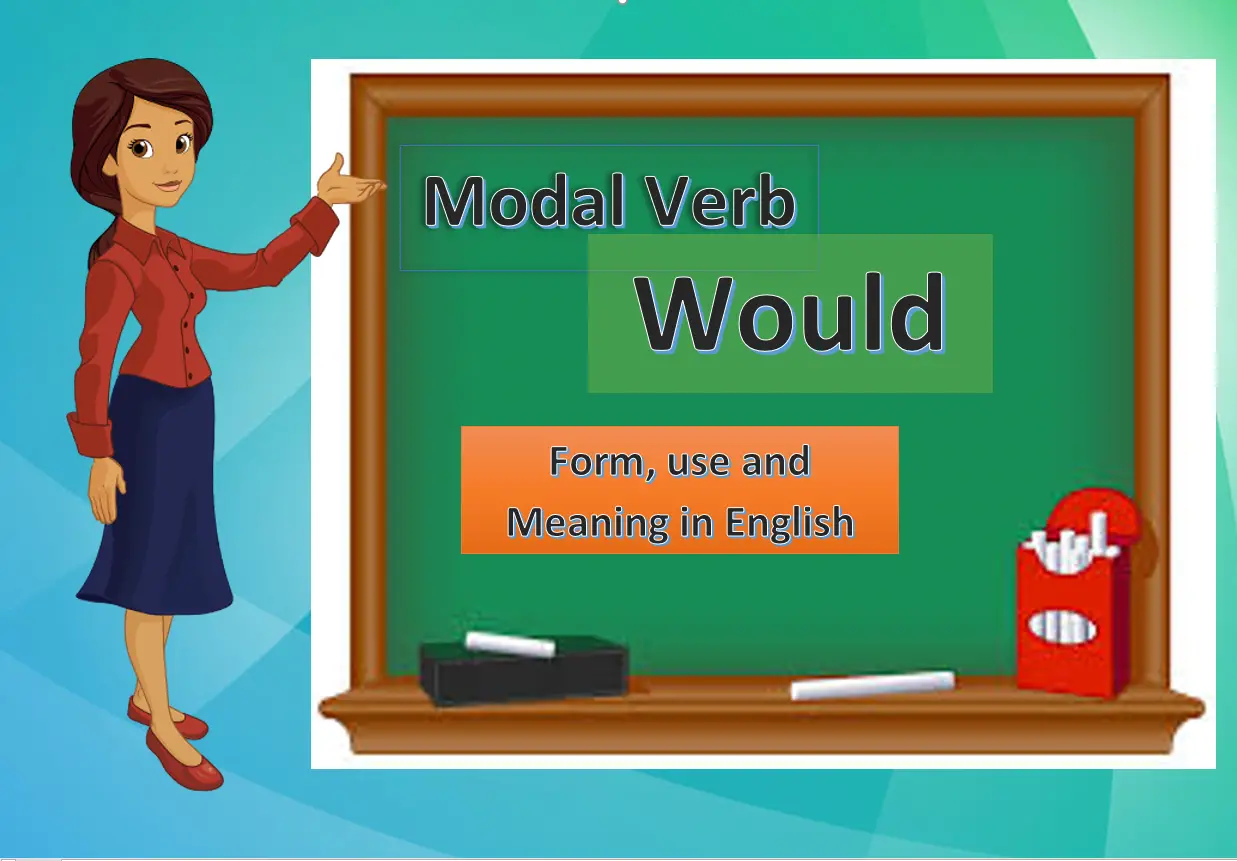Modal Verb WOULD – Form, use and meaning in English
In this complete tutorial about Modal Verb WOULD for beginners’ learners would be able to tell; What does “would” mean in English? When and how do we use “would”? Would is a modal auxiliary verb. In this lesson you will learn the form and uses of the modal verb would. You will also learn the modal verb’s would different examples and meanings. Past habits, Past refusal, Future relative to the past, (would as a past form of will) Indirect speech (reported speech) Polite offers and requests, conditionals and Past unreal situations.
Before we continue, Watch the video here.
Below is a detailed explanation and examples, sentences for each uses of the modal verb “would”.
Would is a modal verb. /wʊd/
In this lesson, you will learn the form of would.
You will also learn the many different uses and meanings.
Past habits
Past refusals
Future relative to the past
Indirect speech
Polite offers and requests
Conditionals
Past unreal situations
Forms and Uses of the Modal Verb Would:
Would – affirmative form
Full Form Contracted form
Subject + would + base form Subject + ‘d + base form
I would like I’d like
You would like you’d like
He would like he’d like
She would like she’d like
She would like she’d like
We would like we’d like
You would like you’d like
They would like they’d like
Would -Negative Form
Full Form Contracted form
Subject + would + not + base form Subject +wouldn’t + base form
I would not like I wouldn’t like
You would not like you wouldn’t like
He would not like he wouldn’t like
She would not like she wouldn’t like
It would not like it’ wouldn’t like
We would not like we wouldn’t like
You would not like you wouldn’t like
They would not like they wouldn’t like
Modal Verb Would – question from
Would+ subject + base form…?
Would I like….?
Would you like…?
Would he like…?
Would she like…?
Would it like…?
Would we like…?
Would they like…?
Past habits
We use would to describe a regular activity in the past.
When Helen was 5 years old, she would practice the piano for two hours every other day.
Every Saturday I would go on a long bike ride.
Past Refusals
We use would to describe refusal in the past.
( a “refusal” is the act of not wanting to do something or the act of not agreeing to do something.)
And this use is usually in the negative form.
Modal Verb “would” Examples:
I
try to calm my brother, but he wouldn’t stop
crying.
I invited her to my birthday but she wouldn’t come.
Future relative to the past
We use would to describe as action that is in the future relative to an older action in the past.
Would is therefore the past form of “will”
—————————————————
Let’s look at a normal future: (future relative to the present)
We will arrive in the evening.
Anna will complete her first essay this October.
My friend will bake apple pie on Sunday.
Future relative to the past
I knew you would fail the exam. You didn’t make any effort!
He asked whether I would help him, but there was nothing I could do.
I told him not to call me that evening, because I would be studying for my finals all night.
He was a sensible boy, and she knew he would take care of him.
Indirect Speech
When we use indirect speech, we use “would” after past reporting verbs where “will” was used in direct speech.
Direct Speech Indirect Speech
“I will go to the doctor’s”. She said (that) she would go to the doctor’s.
“I will write the report”. He said (that) he would write the report.
“The students will collect money”. The teacher said (that) the students would collect money.
“We will eat at twelve o’clock”. Mum said (that) we would eat at 12 o’clock.
Polite offers and requests
We use would to make polite offers and requests
Would you like some cake?
Would you like me to come with you?
Would you pour the wine, please?
Would you help me cook dinner, please?
Conditionals
We use would in conditionals to describe unreal situations
2nd conditional (unreal situation in the present)
If I live in a farm, I would love to raise chickens.
3rd conditional (unreal situation in the past)
If she had studied, she would have passed the exam.
If we had taken a taxi, we wouldn’t have missed the plane.
Unreal situation in the past
We use would to describe unreal situations in the past that are not conditionals.
Form: would + have + past participle
(perfect infinitive)
Modal verb would Examples:
Would have lived
Anne: Why did you live in Chiangmai?
Paul: Well I would have lived in Bangkok but it was too expensive.
Would have studied
I would have studied criminology but I chose education instead.
So, you’ve just learned a complete tutorial on Modal Verb WOULD – Form, use and meaning in English, and practice to use them correctly.
For more readings
- There is vs There are How to Choose? -Learn to Speak English Fast
- Phonics ea Words Vowel Team “EA” Complete Tutorial
- Consonant Blends “fr” Words as in Frog With Sample Excercise
- Words with o Sound As In Pot
Downloadable Materials
Download here the Power point Presentation that can be used to your classroom discussion.


